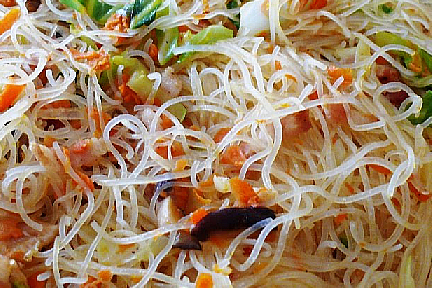Vegetarian bee hoon is a Singaporean noodle dish which comprises vegetarian spring rolls, fried tofu skin, and mock meats made from gluten. Usually, the bee hoon is fried first and put in a large container, when an order is placed, other cooked ingredients are added to the bee hoon.
Buddhist cuisine is an Asian cuisine that is followed by monks and many believers from areas historically influenced by Mahayana Buddhism. It is vegetarian or vegan, and it is based on the Dharmic concept of ahimsa (non-violence). Vegetarianism is common in other Dharmic faiths such as Hinduism, Jainism and Sikhism, as well as East Asian religions like Taoism. While monks and a minority of believers are vegetarian year-round, many believers follow the Buddhist vegetarian diet for celebrations.
The origin of "Buddhist food" as a distinct sub-style of cuisine is tied to monasteries, where one member of the community would have the duty of being the head cook and supplying meals that paid respect to the strictures of Buddhist precepts. Temples that were open to visitors from the general public might also serve meals to them and a few temples effectively run functioning restaurants on the premises. In Japan, this practice is generally known as shōjin ryōri (精進料理, devotion cuisine), and served at many temples, especially in Kyoto. A more recent version, more Chinese in style, is prepared by the Ōbaku school of zen, and known as fucha ryōri (普茶料理); this is served at the head temple of Manpuku-ji, as well as various subtemples. In modern times, commercial restaurants have also latched on to the style, catering both to practicing and non-practicing lay people. (wikipedia)
Buddhist cuisine is an Asian cuisine that is followed by monks and many believers from areas historically influenced by Mahayana Buddhism. It is vegetarian or vegan, and it is based on the Dharmic concept of ahimsa (non-violence). Vegetarianism is common in other Dharmic faiths such as Hinduism, Jainism and Sikhism, as well as East Asian religions like Taoism. While monks and a minority of believers are vegetarian year-round, many believers follow the Buddhist vegetarian diet for celebrations.
The origin of "Buddhist food" as a distinct sub-style of cuisine is tied to monasteries, where one member of the community would have the duty of being the head cook and supplying meals that paid respect to the strictures of Buddhist precepts. Temples that were open to visitors from the general public might also serve meals to them and a few temples effectively run functioning restaurants on the premises. In Japan, this practice is generally known as shōjin ryōri (精進料理, devotion cuisine), and served at many temples, especially in Kyoto. A more recent version, more Chinese in style, is prepared by the Ōbaku school of zen, and known as fucha ryōri (普茶料理); this is served at the head temple of Manpuku-ji, as well as various subtemples. In modern times, commercial restaurants have also latched on to the style, catering both to practicing and non-practicing lay people. (wikipedia)

- Soon Long Sin Vegetarian - 10 Marsiling Industrial Estate Rd 1
- Lotus Vegetarian Restaurant - Quality Hotel #02-00
- Ru Yi Yuan Vegetarian Food 如意园素食 - 80 Redhill Lane
- Ru Yi Yuan Vegetarian Food 如意园素食 - 46-1 Tanglin Halt Road
- Zhen Ji Vegetarian Food 珍记斋 - Holland Drive Market & Food Centre #02-26
- San Yuan Vegetarian 三元斋 - West Coast Market Square #01-149
- Hong Nian Vegetarian Food 宏年素食 - 327 Hougang Ave 5 #01-156
- New Fut Kai Vegetarian Restaurant 新佛界素食 - 282 Jalan Besar
- Eight Treasures Vegetarian - 282 South Bridge Road
- Greenland Vegetarian Restaurant - 789 Upper Serangoon Road
- Ci Yan Organic Vegetarian Health Food - 8 Smith Street
- Fo You Yuan Vegetarian Restaurant 佛有缘 - 310 Lavender Street
- Fo Lai Ping (Popular) Vegetarian 佛來品 - 107 Lorong 1 Toa Payoh
- Whole Earth - 76 Peck Seah Street
